Featured Article:
Author: Anjum Javed, Reveal HealthTech
INTRODUCTION
Hyperautomation, as the name suggests is an approach to turbo charge and scale the automation in an enterprise by recognizing business processes and creating an orchestration layer atop the existing IT infrastructure to co-ordinate the workflows for increasing levels of automation. It is about envisioning an enterprise where the approach is to automate all what can be automated with a people centric approach. It necessitates the use of many technologies acting in tandem, which implies that organizations investing in it must have the appropriate tools, which must also be interoperable. Discovering, mapping, making compliant and auditable, then automating and measuring the success of business processes in a cyclical fashion for improved business benefits is what hyperautomation is all about.
Gartner forecasts worldwide ‘Hyperautomation-Enabling Software’ market to reach nearly $600 Billion by 2022. By 2025 the market for software that enables hyperautomation for both Business and IT will reach nearly $860 billion, with a CAGR of 12.3%
- The worldwide market for technology that enables Hyperautomation will reach $596.6 billion in 2022, according to a new forecast from Gartner, Inc. This is up from $481.6 billion in 2020 and a projected $532.4 billion this year
Unraveling Hyperautomation: What it is? What it is not?
Hyperautomation, as we have come to understand it is not the holy grail and will not enable zero touch automation in every aspect of business obviating the need for human judgment altogether, rather Hyperautomation is an ideology that aims at automating all aspects of business processes as much as possible, whether it is Transactional – Standard, Transactional – Non-Standard, Judgement based to automate them with a mix of zero touch and assisted automation to make the process as much automated as possible thus reducing human error, and enabling better risk and control of the process.
Hyperautomation is not a silver bullet solution to all organizational process woes but is an approach that needs to be thought through well when trying to implement it in a business or industry context. Need to understand the People, Process, and Technology aspects when considering any Hyperautomation initiatives for long-term sustainability and growth. Hyperautomation provides opportunities to improve the processes over time by mining the processes and analysing them for waste, duplication of work efforts, non-value added work and ROI determination on an ongoing basis like a guiding north star as the business evolves.
Hyper-automation in essence is the orchestrated use of a multitude of development tools, software and platforms for allowing ease of actions, boosting profitability and digitization to enhance overall organisational efficiency. Organisations and businesses have discovered that only a single tool or a siloed technology cannot bind together the soul of its operational activities which have certain procedural complexities. In order to be strategically scalable and digitally optimised, they need to latch on to hyper-automation to move beyond siloed automation to embrace a synergistic orchestration of people, technology, which helps to augment business processes. Hyperautomation is a mindset and an approach to automation which is at the confluence of different technologies like RPA, AI ML, API based automation, iBPMS, Blockchain, IOT all acting in concert for realizing better operational efficiency, revenue opportunities and risk management. Change management and People aspect are core to an effective implementation of Hyperautomation framework and principles. Hyperautomation facilitates the creation of digital twins or “Avatar” for both physical devices as well as business processes which helps in testing organizational changes without actually involving the systems and the physical resources, thus enabling better competitiveness and predictability in business outcomes before actually putting them in production. In this way, the processes will be able to modify themselves and identify when other related processes are going wrong or underperforming. The digital twin aspect helps engage companies in the natural accumulation of quality data and gives them the innate ability to course correct on the processes for better calibration, value realization and avoiding waste or costly downtimes over a period of time. Hyperautomation definitely aids faster time to compliance to meet the regulatory requirements in many industries with AI augmentation.
Hyperautomation platforms hides and abstracts the gory details of back end integrations with the legacy systems, systems of record, systems of engagement and systems of innovation and gives one unified interface to the agent or the business user to perform work and decision making in the process flow.
Hyperautomation also accelerates the pace of Data Driven Transformation in any organization and shortens the cycle from Data to Insights. The Master Data Management / Data Governance practice of an enterprise can be standardized and integrated with the Hyperautomation platform with visualization capabilities, thus helping in accelerated and accurate data driven insights for understanding and visibility of key KPIs for better KPI management with intuitive dashboards. With the Entity relationship mapping, the data models can help determine the effect of upstream changes on downstream processes for better process control and KPI management.
Automation vs Hyperautomation
Figure 1. Below is a comparative of how the Hyperautomation ideology is vastly different from the traditional automation approach:
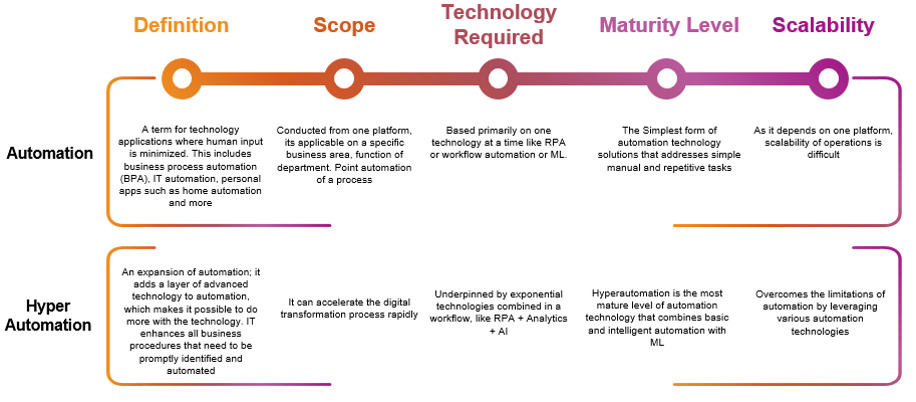
Figure 1: Automation vs. Hyperautomation
Traditional automation addresses the realization of a process with structured datasets on an individual task which is smaller in scale. In contrast, hyperautomation enables organizations to automate processes that include unstructured / semi-structured data that is more complex and judgment based. These hyperautomation paradigm enables learning, reasoning, and self-correction. For building resilience after COVID, 57% of businesses worldwide invested in RPA and intelligent automation, 21% invested in big data and analytics, 7% in ML, and 15% in other trending technologies. As per a recent study, 47% of employees consider RPA to enhance performance, human-bot collaboration is being encouraged by introducing software bots and digital workers alongside employee activities. Figure 2. is a depiction of the allied technologies which are the key enablers for hyperautomation.
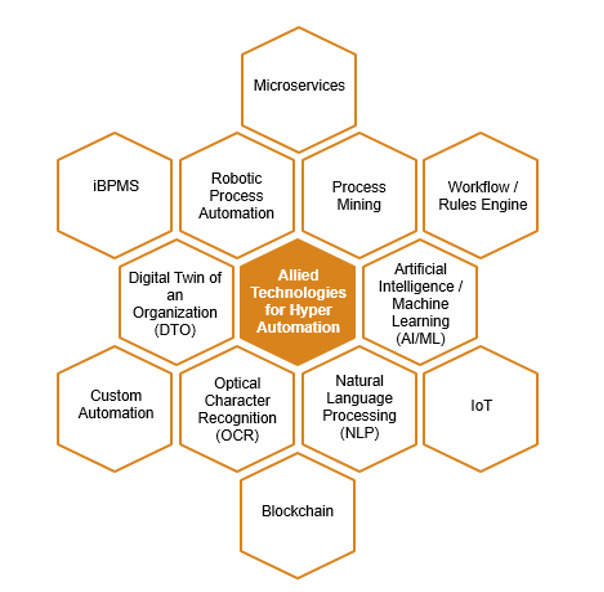
Figure 2 : Allied Technologies for Hyperautomation
Benefits of Hyperautomation
Hyperautomation is geared to address the following challenges in an Enterprise IT for carrying out the business operations. Figure 3. Below is a depiction of what problems or challenges hyperautomation is geared to address in an Enterprise.
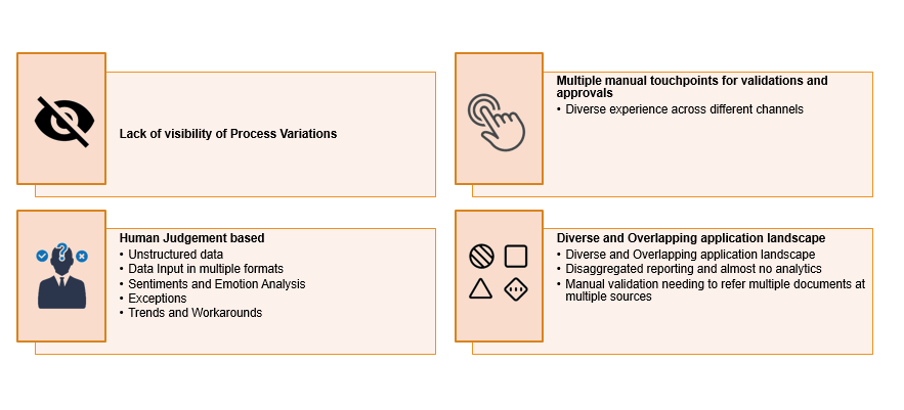
Figure 3: Problems in an Enterprise IT landscape
The Hyperautomation platforms can sit non-intrusively atop the existing IT infrastructure not requiring any additional investments for the use of technology. To adopt Hyperautomation, one need not overhaul the IT infrastructure as the Hyperautomation platform can seamlessly bind and orchestrate the data flows between On-Prem and Cloud Infrastructure (in case of Hybrid cloud) or cloud native architecture. The Hyperautomation platform will enable a front end for the analysts/agents with all the backend connections to the legacy system and data sources enabled through pre-built connectors enabled on the platform and smart workflows enabled to make the process straight thru (low touch / no touch) on low complex/rule based tasks and enabling assisted automation on more complex/judgement based tasks which require extracting meaning from the terms in the documents and then exercising judgement to complete the transaction or the process. The hyperautomation system hides the complexity of back-end integrations, thus enables a seamless one stop shop for all Automation needs. There is a persona-based view of understanding Hyperautomation. Hyperautomation gives better control to the agent, thus increasing employee satisfaction. Hyperautomation can create better efficiencies/TAT reduction/Cycle time reduction/ reduce the margin of errors across the various touchpoints for process realization leading to enhanced customer satisfaction (CSAT/NPS). It also helps realize more value from the existing IT investments by avoiding waste in the system by having a Digital Twin of the processes and monitoring them for any course correction.
Jumpstarting Hyperautomation in an Enterprise – Laying the Foundation
With the introduction of Hyperautomation in the industry, every aspect related to business is evolving. An organization planning to implement Hyperautomation requires a robust automation framework to be in place. Hyperautomation further may help establish a flexible and dynamic workplace, using data for fast and efficient decisions. Below are a few considerations before starting on the Hyperautomation journey:
- Process Discovery – Understand the gaps, redundancies, wait time, deviations in the process to identify the opportunities to streamline the process. There are platforms like skan.ai, Fortress IQ which use computer vision based technology for Process Mining and Process discovery
- Process Standardization – Look for any opportunities to standardize or consolidate the steps in the process before considering it for applying the hyperautomation principles
- Understand the Transaction volume and the segregation of volume basis Standard – Transactional, Non-Standard Transactional, judgmental and identify which Digital lever can be applied (RPA, AI, ML, OCR, NLP) at different process steps to transform the value chain.
- Identify the low hanging fruits to prioritize the processes for Hyperautomation and develop a start small – grow big strategy to scale hyperautomation for the enterprise.
- There are tools and low code platforms available in the market like Outsystems, Mendix et al. which enable drag and drop interfaces which help organizations looking to get started in their Hyperautomation journey without the need for specialized technical skills and infrastructure investment. From delivering flexibility required in your business operations to deploying workloads in a On-premises, private cloud, or Hybrid cloud, performing specific tasks like automating financial fraud detection and IoT-connected device analysis and enabling the use of Blockchain, these tools and software make sure to get it all covered according to the user’s needs and requirements.
Use Cases of Hyperautomation
Banking, Insurance, Shipping and Logistics, Travel and Healthcare present massive opportunities for Hyperautomation use and adoption in the industry context. Figure 4. below is a compendium of a few use cases that lend itself to Hyperautomation and can be considered by organizations while prioritizing their Hyperautomation spends.
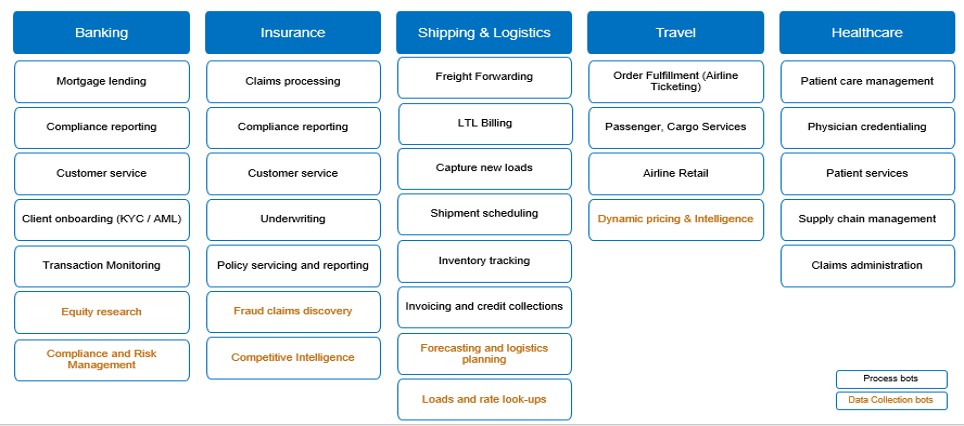
Figure 4: Use Cases of Hyperautomation in Various Industries
The Disruptive impact of Hyper-automation on the Insurance, Shipping and Logistics, Medical and Healthcare Sector
Insurance: The insurance industry has been waiting for a digital overhaul for some time and the pandemic has hastened the pace of development in the Insurance sector. There have been reams of claims piling at the Insurance service providers and claims taking longer than usual for settlement, with bandwidth being stretched thin during the pandemic. For e.g. in the Motor Insurance space which is a very competent business in many geographies, many Insuretechs have sprung up with a multitude of offerings ranging from AI enabled Policy assessment, Damage assessment, liability assessment, and cost repair estimation, RPA for auto allocation of claims to the claims handler, payments, follow-ups. Many niche specialized Insuretech firms are bringing the combined capabilities of many different InsureTech together via API integrations and then orchestrated on a platform with self-serve/chatbot options for the end customer thus enhancing the customer experience and effort reduction/step elimination/reduction of indemnification losses to realize the benefits of Hyperautomation and transforming the customer journeys. While most of the simple (own damage) cases with less than a certain value, with liabilities assessed at FNOL stage can be made straight through, the medium complexity ones where there is a third party angle (single or multi-vehicle) can be automated to a considerable extent with low touch with the digital interventions all orchestrated on a hyperautomation platform. Computer Vision based AI can be used for accurate damage assessments of vehicles (Total Loss vs. Repair) l in Motor Insurance and come up with accurate cost estimates for repair or Total Loss settlements. Accurate liability assessments and policy validations/assessments, repairer recommendations with AI enabled intelligent workflows at FNOL stage. AI can also help in identifying additional Fraudulent claims at FNOL stage which also helps in additional indemnification related savings. Figure 5. Below is a schematic of Motor Claims transformation with hyperautomation with configurable rules engine and mapping of the digital levers in the value chain to transform the process end to end.
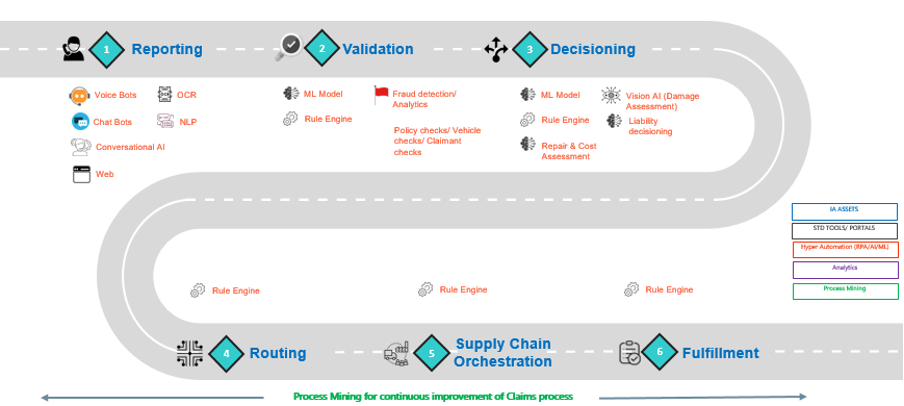
Figure 5: Envisioning Claims transformation with Hyperautomation
Insurance sector stands to benefit greatly from Hyperautomation in the Underwriting space as well. The underwriting process tends to be very labour intensive and require a large amount of manual work in searching, aggregating, analysing, validating information and hence these processes lend themselves nicely to be the pick for applying hyperautomation and seek the benefits of straight through or low touch/assisted automation. These are also the processes where a large amount of time is spent by the high skilled agents/processors in data entry / maker checker jobs which can be easily automated with a platform based approach using the synergistic power of Cognitive Automation, RPA, AI, ML, NLP, CV, Smart workflows to a great extent and free up the labour to take on more value added work.
Shipping and Logistics: S&L industry presents a huge opportunity in the Ship-to-Collect process where the fields in the Bill of Lading document needs to be extracted and billing instruction need to be executed for invoicing and collections. The challenge in this area is that for each shipper and consignee there can be different business rules and edits that apply while trying to establish the billing details for accurate invoicing. There is heavy volume variation in document formats, significant difference in the way different documents are handled, low visibility on KPIs, Data entry is manual and calls for domain specific knowledge and skilled resources.AI based cognitive engine to handle shipping documents in various formats to extract key information from the Bill of lading documents about Bill to, Ship To, Consignee, Commodity, Shipping instructions etc. and enable automated push of the information to the target systems of record through API integration and/or RPA. Hyperautomation has the potential to reduce Freight disputes in billing, reduce manual errors in interpreting the SOPs and finding key information, enable better accuracy in payments to suppliers and carriers avoiding revenue leaks or disputes.
Travel: In Online Ticketing Agent business, there is a substantial volume of requests for refunds/reschedule/cancellations coming for which policy needs to be looked up and terms understood manually before arriving at a decision or making any recommendations of next best actions amidst myriad policy / Fare rule changes from time to time. An intelligent Hyperautomation system with taxonomy understanding and AI algorithms can help the OTA business greatly by enabling the extraction of key terms from the policy with NLU/ NLG and can respond to the request by identifying the applicable policy terms to service the request End to End which can originate from any channel (Voice/Webchat). This eventually reduces the manual work and error rate, improves the data quality and compliance, increases the number of cases handled in a stipulated time and ability to address the spikes in volumes for seasonal variations without beefing up the human capacity.
Healthcare: The pandemic has led to the acute shortage of human resources in the healthcare sector in particular and the need to increase the efficiency of the available resources. They are also struggling to maintain data and process it to offer enhanced healthcare outcomes. To tackle this problem, the healthcare industry needs to leverage the technologies of Robotic Process Automation (RPA), Artificial Intelligence (AI) and Machine Learning (ML) to improve agility, scale-up operational efficiencies, bring more accessibility and reduce the cost of care. Figure 6. below shows the various aspects of healthcare business where hyperautomation with AI and Robotics as the key enabler is poised to bring in greater benefits for healthcare practitioners, service providers, research community and the patient.
Hyperautomation along with AI as the key enabler has huge potential to transform the Clinical and operational workflows for provider business for better patient outcomes. There are a number of use cases like remote patient monitoring, predicting hospital readmission cases, scheduling appointments can be automated with AI as the key lever for better value-based care. AI augmented care can be a boon for the nurses, clinicians physicians to free them up from the administrative tasks which AI can increasingly take up, so that they can focus on improving the quality of care thus improving patient outcomes.
Hyperautomation enables continuous remote monitoring of the patient vitals for any early warning signals using technologies like Internet of Things (IoT), wearables, digital health assistants to check parameters like glucose level and blood pressure etc., thus enabling proactive interventions to avoid the cost of readmissions at the hospitals and use predictive and prescriptive analytics for patient outreach for pre-emptive care and medicine. Empathetic or wellness chatbots can be deployed on Hyperautomation platforms to render Psychiatric counselling or medical help 24*7 and only the critical cases are turned over to a medical practitioner, thus saving on a lot of costs for care giving. AI-powered virtual agents can help automate schedule/re-schedule appointments, process mining and data analytics to verify the insurance as well as patient registration process. The Healthcare data can also be tied to insurance where the person may stand to get benefits in Insurance premiums if they are able to maintain a healthy record of accomplishment.
There are use cases for abstractive summarization which can be of aid in patient care business where the care giver does not have to go through reams of medical records to create a summary or synopsis report. Multimodal reasoning capabilities in the transformer-based AI models can take things to the next level where the machine can draw contextual information from different modalities like Lab/ Radiology reports, prescriptions, discharge summary, EHR, past medical history, current medical condition and then devise the right treatment for the patients for a given medical condition thus improving the quality of care. It is like having a vision of the forest while looking at the trees. The Large Language Models and the Multimodal Large Language models can help the doctors and physicians to get an understanding of the parameters which they may be missing to get to the right diagnosis and prescribe the right treatments. Generative AI can also help in generating synthetic data for training the models as the data for model training may not always be available due to regulations like HIIPA etc.
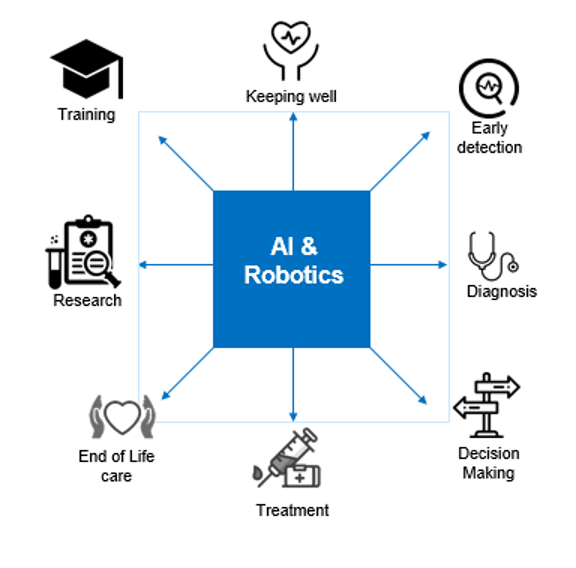
Figure 6: Transforming Healthcare with AI and Robotics
The boom in telehealth is expected to reach US$185.6 billion by 2026. 30% of IoT devices market share comes from healthcare only, which justifies healthcare reliance on IoT. Laboratories and clinics need to collaborate with each other to implement EMR and the data needs to be captured in real-time and transformed into intelligible processes. While healthcare extensively depends on expertise, training, and experience, AI should be in the forefront, backed up by RPA and Hyper automation for delivering a higher-value diagnosis, vaccine development, clinical trials, quality, and compliance management. Healthcare providers will see a shift from traditional complex workflows to automated Revenue Cycle Management (RCM), having intelligent process automation infrastructure, which is expected to improve revenue by 5% and reduce expenses by 20%.
Now, with the advent of Generative AI, there are tools and platforms ow being developed with Generative AI capabilities which can handle the exceptions gracefully and help hyperautomate the clinical workflows with a conversational interface. Industries like healthcare leverage LLMs for groundbreaking strides in data analysis. Yet, these sectors grapple with stringent privacy concerns. The dilemma arises from the reluctance to expose sensitive data to shared APIs. Alternatives, like hosting open-source LLMs on established cloud platforms such as AWS, Azure, or Google Cloud, present a viable solution. These platforms have demonstrated compliance with rigorous regulations like HIPAA, offering a safeguard for sensitive data.
Roadblocks for Hyperautomation Implementation: Only a handful of organizations worldover are currently executing Hyperautomation on a large scale due to fragmented processes, a lack of IT readiness and a clear enterprise-wide strategy as the key constraints. Even though Hyperautomation has been disruptive, it has faced some challenges too namely, the cost of deployment and initial capital requirement is high; reluctance from workforces to adopt AI in fear of humans being replaced and traditional practices being outdated; concerns of privacy and security in mobile health applications using AI for instance; lack of interoperability between disparate solutions; intensive training and iterative process of software up-gradation. Another roadblock to implementing hyperautomation in enterprises is the lack of a broader vision. Its implementation has been in a piecemeal fashion without an overall strategy. Due to Hyperautomation taking greater magnitudes with more adoption, the roles and responsibilities of the employees also change, bringing in resistance from their side. The businesses will need to carefully assess how the functions, tasks, and processes change, and how it affects the employees, and retrain them accordingly.
Hyper-automation on Cloud- Latest trends and Challenges
Hyperautomation can greatly benefit from the scalability in the cloud to meet the operational demand. To implement hyperautomation with ease and scale, organisations need to embrace a cloud-based automation centric approach. The hyperautomation platform should support Multi cloud, hybrid cloud architecture for deployments and should be able to orchestrate workloads across multiple cloud environments, on-prem servers. Cloud and container platforms are now the enablers of Hyperautomation as it becomes a managed and serverless platform with less human intervention. Leading Low-Code / No-code platforms like Outsystems, helps organisations to get started with their Hyperautomation journey in the cloud with built in AI, Analytics and Low-code tooling. Hyperautomation platform should support the use and deployment of dockerizable microservices through API. Dockerizable services can be deployed across any cloud. AWS lambda functions enable a serverless compute infrastructure and is a new paradigm emerging to enable serverless compute environment from which Hyperautomation can benefit. New emerging frameworks in Generative AI like Langchain are poised to take hyperautomation to the next level by creating intelligent agents which are able to chain the output of LLM to the input of another by chain of thought reasoning and then helping to hyperautomate a transaction flow or a process step in various industry contexts and use cases.
Sensitive and PII data needs to be protected in the cloud through masking, anonymization and encryption techniques used at client and server end as the data gets persisted and used in the process flows. To ensure the safety of this sensitive data, firms can use data Encryption techniques for data at rest and in motion. Data-intensive applications on Cloud require high network bandwidth, which can be a challenge for many firms, to employ Hyperautomation at scale.
Building Blocks: Process Flows, Event Flows, Data Flows, ML Flows
The smart workflows are set up for execution in Hyperautomation platforms where the Process Flows, Event Flows, Data Flows and ML Flows act in concert for event or non-event generated orchestrations to realize a process end to end with minimal touch enabling directed process flow, data retrieval and data manipulation, ML based decisioning (if needed) in the workflow. The hyperautomation platforms offer modularity and control to design and execute the processes and get real-time feedback if one process is having an impact on the other for any course corrections. If you have the data that can be exposed as REST End Point or in a Database (Relational, No-SQL), the Hyperautomation platform can consume it, persist it, and then enable decision-making with the data in the workflows. As Hyperautomation platforms mature, the need is felt to have more sophisticated AutoML and MLOps features also to be supported natively on the platform.
Services like Azure IOT Hub can be enabled on the Hyperautomation platform to get ingest the data from IOT-based sensors for decisioning in the workflow for Industry 4.0 use cases aligned to Manufacturing and heavy industries.
Hyperautomation Foundry – Under the Hood (What lies beneath):
Below is a schematic of what goes on in a Hyperautomation orchestration platform and the architecture principles.
Hyperautomation platforms architecturally needs to support the Data Pipeline for Data gathering, Data Ingestion, Data Processing and Data Storage.
It is not big data that is needed all the time, even small data can have meaningful insights embedded in it. To do that, there are popular Open source In-Memory databases like H2, Redis that can be used for storing and persisting data in memory and performing analysis on the data in a hyperautomation platform for the duration of the process as the data moves forward in the workflow for decision making. The type of applications that can typically benefit from In-Memory databases usage are IoT sensor data for predictive analytics, e-Commerce websites – cart data for fast retrieval and real-time updates.
The platforms should also support ML and Analytics Pipeline and provide support for building, deploying and Monitoring the ML models for holistic automation. The Hyperautomation platforms should ensure the integrity of the Data at rest and Data in motion by ensuring the necessary measures for Data Security and Privacy as mandated by the organizations and the law of the land as in the case of GDPR, CCPA etc. The Hyperautomation platforms need to persist the data as the data moves forward in the workflow for data driven decisioning.
The Hyperautomation platforms offer persona-based access to the environment and can be viewed with the core functionality abstracted in a layered architectural approach. The authoring layer enables drag and drop design interface for a citizen developer or a business user to create the process and data models. The collaboration layer supports the configurations for usage of Pre-Built Connectors/Custom Connectors to connect to the target systems (like SalesForce, Oracle, SAP etc.). The runtime layer enables the accessibility of the fully functional Process Flows through Web Apps, Mobile Apps, REST End Point.
The Business Applications can then use the process flows within a BPMS App or any Analytics App or Reporting App for Business and Operational use. The UI/UX for the Business Applications can be designed for Web / Mobile and can be customized for various form factors on multiple device types (iOS, Android, Windows). Figure 7, shows the building blocks of a Hyperautomation platform.
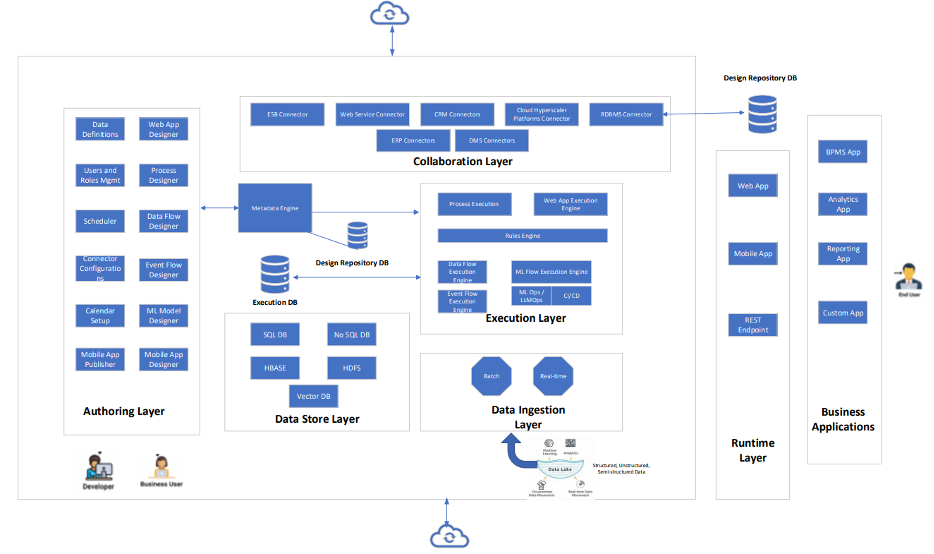
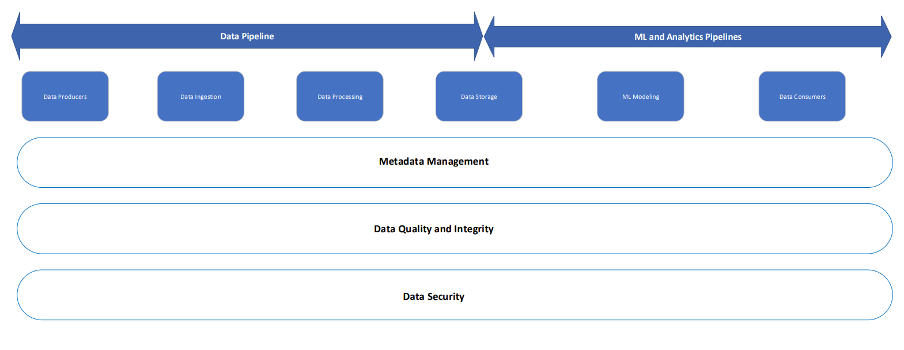
Figure 7: Hyperautomation Platform Architecture
Conclusion:
Hyperautomation has expedited industrial revolutions — Industry 4.0 and moving on to Industry 5.0, resulting in significant changes in processes and surroundings that rely on cyber-physical and cognitive systems. There will be emerging job roles, and some functions will cease to exist as hyperautomation becomes more mainstream. Upskilling the employee base and investing in a designed innovation program will ensure a healthy collaboration and sustenance eventually. The need for Hyper-personalization, micro-moments and the integration of prescriptive analytics will further drive the adoption of Hyperautomation solutions for enhanced customer services in various industries. The companies can focus on productionizing hyperautomation pursuits to be able to realize true business benefits by adopting a methodical approach to take the automation from PoC to Pilot to Production and scale them in a phased manner. The organizations of tomorrow will be measured on the Productionizing ability on Hyperautomation pursuits to assess the maturity of Hyperautomation practices in organizations. Generative AI can take Hyperautomation to the next level by enabling a more sophisticated Conversational AI interface (with NLP/NLU/NLG and multimodal reasoning) capabilities which is powered by LLM at the back end which is fine tuned on task specific dataset for more contextual responses and even be able to handle the exceptions with grace by keeping the conversation in the execution flow until closure. While considering LLMs to enhance hyperautomation capabilities, it is worth looking at the customizability aspect and the security aspect of these models. In the intricacies of LLM adoption, striking a balance between response quality, economics, latency, and security becomes paramount. These multifaceted considerations shape the path toward effectively harnessing LLMs for transformative applications using hyperautomation principles.
Title picture: freepik.com
India’s largest platform for AI & Analytics leaders, professionals & aspirants
3AI is India’s largest platform for AI & Analytics leaders, professionals & aspirants and a confluence of leading and marquee AI & Analytics leaders, experts, influencers & practitioners on one platform.
3AI platform enables leaders to engage with students and working professionals with 1:1 mentorship for competency augmentation and career enhancement opportunities through guided learning, contextualized interventions, focused knowledge sessions & conclaves, internship & placement assistance in AI & Analytics sphere.
3AI works closely with several academic institutions, enterprises, learning academies, startups, industry consortia to accelerate the growth of AI & Analytics industry and provide comprehensive suite of engage, learn & scale engagements and interventions to our members. 3AI platform have 16000+ active members from students & working professionals community, 500+ AI & Analytics thought leaders & mentors and an active outreach & engagement with 430+ enterprises & 125+ academic institutions.

